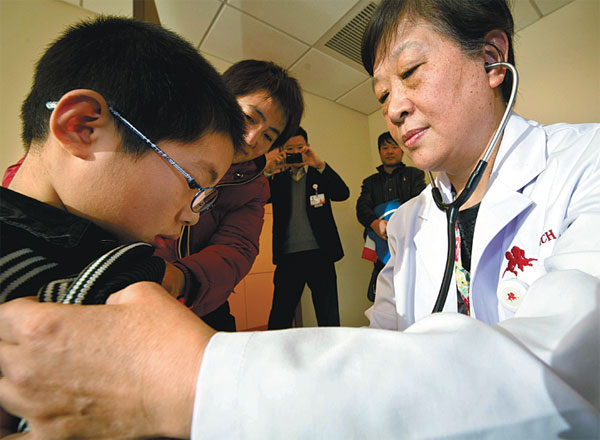Breathing new life into the healthcare system
By Wang Xiaodong (China Daily) Updated: 2015-01-20 07:53
 |
|
A doctor examines a child at a private hospital in Tianjin. In China, doctors at public hospitals are usually full-time employees, but things are changing after the government introduced policies to encourage doctors to move into the private sector. Yue Yuewei / Xinhua |
As China moves to boost the private sector, many doctors employed by public hospitals are taking advantage of changes in the rules to work part time in non-State-run establishments, as Wang Xiaodong reports.
Zhu Gang, a urologist at a public hospital in Beijing, initially sought part-time work at Beijing United Family Hospital in 2004 to maintain his English, because many of the hospital's doctors and patients come from overseas.
Although he didn't know it at the time, Zhu was a trailblazer, and now the government is encouraging other doctors to follow his example
The 48-year-old has worked full time at Beijing Hospital since 1990. In 2000, the hospital sent him overseas to study for a PhD and undertake post-doctoral research at King's College, London. It was on his return in 2003 that he decided to outsource his talents, even though he didn't obtain a license to practice at outside institutions until about two years ago.
During his time at BUFH, a US-Sino healthcare joint venture, Zhu's professional life has been deeply rewarding, and he's done far more than simply keep his language skills and earn extra money. "Here I have learned lots of things I wouldn't learn at my main employer, such as a totally different management system that promotes greater efficiency," he said.
Policy changes
Now, changes to official policy are making it easy for other doctors to follow in his footsteps, but legally. "The policy changes of the past few years have made it much easier for doctors in public hospitals to apply for part-time jobs at private establishments," Zhu said.
In China, doctors in public hospitals are full-time employees, and aren't usually allowed to work elsewhere without the consent of their employers, who, in addition to paying their salaries, also handle matters such as social security contributions. Now though, many public hospitals are concerned about a potential talent drain if the number of employees choosing to work part time in other institutions rises.
In recent years, a number of measures have loosened the ties between doctors and hospitals. Earlier this month, the National Health and Family Planning Commission announced that some health authorities are planning moves to further assist doctors who want to offer their skills to a range of establishments, including simplifying the registration procedures so they won't need their employer's consent.
"Encouraging the flow of doctors and medical resources can provide better services to the people," the commission said.
Since 2011, doctors registered with the Beijing health authorities have been allowed to work for people other than their main employer, and a few places, such as Guangdong province, follow similar policies.
In August, doctors were given even greater autonomy when new rules were released allowing them to work at as many institutions as they wish, compared with the maximum of three stipulated under the previous rules.
More than 2,500 doctors in the Chinese capital have registered for multi-institute practice, according to the Beijing Commission of Health and Family Planning. However, many unregistered doctors also work several jobs, and in the past it was common for senior doctors at public hospitals to work part time at smaller institutions, said Han Xiaofang, director of the Beijing Medical Reform Office.
- Govt encourages people to work 4.5 days a week
- Action to be taken as HIV cases among students rise
- Debate grows over reproductive rights
- Country's first bishop ordained in 3 years
- China builds Tibetan Buddhism academy in Chengdu
- Authorities require reporting of HIV infections at schools
- Typhoon Soudelor kills 14 in East China
- Police crack down on overseas gambling site
- Debate over death penalty for child traffickers goes on
- Beijing to tighten mail security for war anniversary







